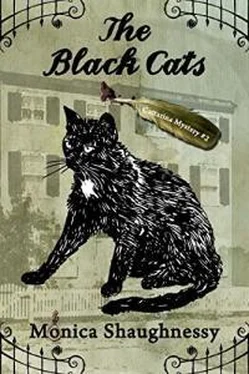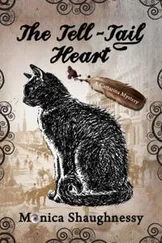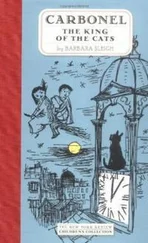The door opened.
An older, white-haired gentleman I hadn’t seen since the fall stood before us in a brown suit and blue waistcoat. I hadn’t been the only one to pack on flesh since our move, though Constable Harkness wore it better than I. He held a watering pot that dripped onto the toes of his shoes. “May I help you?” he asked.
Sissy assumed the lead. “We’ve come to—”
“By God, it’s you! It’s really you!” the constable said to her. He smiled at me, teeth hidden by his bushy mustache. “And you’ve brought that cat of yours! Fine specimen, she is. Beautiful tortoiseshell.”
A cough escaped her mouth instead of a greeting.
“Come in! Come in! The air is terrible here.” The older man led us, rather her down the tapestry hall runner. “You can thank the iron works for the smoke. The factory’s almost next door.” We entered the parlor. On my last visit, I’d stayed outside and eavesdropped from the window. The interior had a brassy, bright feel, more so than I would’ve imagined given the man’s tarnished demeanor. “How have you been? Why I haven’t seen you since—”
“Since you came to our house on Coates,” Sissy added.
“Harumph, yes, of course,” he said.
The constable offered us the couch, a tufted affair that poked my hindquarters with buttons. Eddy and Sissy sat on either side of me, and I made a home between their knees. Skulls, a strange brass tube, a raccoon tail, glass orbs in every size, a collection of dead butterflies, and other oddities beckoned me from a large curio cupboard spanning the wall adjacent to the fireplace. While these items intrigued me, they paled when compared to the large ivy sitting atop the cabinetry. A fantastical plant, its numerous tendrils tumbled over the woodwork and cascaded toward the floor, giving one the impression they had entered not a brownstone, but a jungle. I longed to scale the greenery and explore the upper environs. Alas, a diversion was out of the question. Any tomfoolery on my part would unravel the investigation faster than lace tatting between the claws. Muddy had still not forgiven me for shredding her favorite doily.
“So you and Constable Harkness are acquaintances?” Eddy asked his wife. “You spoke only briefly last October.”
Sissy shook her head at Constable Harkness. Eddy did not catch it as I did.
“I am a memorable fellow,” the constable said to him. He set his watering can on a side table.
“And my cat?” Eddy asked.
“Cattarina? Why I barely know her,” he replied.
When the constable called me, I jumped from the couch and rubbed along his pant leg, ingratiating myself to him. I had escaped parrot prison, battled fire, grappled with a killer, survived bodily harm, and yet this act took the most courage. I am not, nor have I ever been one to grovel. Nevertheless, Constable Harkness had the resources to find Midnight. The older gentleman sidestepped my generous deposit of fur. Odd. Had he not spoken my name? He retreated to a wingback chair near the fireplace and flapped his fingers, discouraging me from further attempts.
“ Barely know her . I see,” Eddy said. He turned to Sissy.
Her cheeks flushed more than usual. “We should explain ourselves, Constable Harkness,” she said. “We have much to tell.”
“It’s not a social call?” He glanced at the sprawling plant. “Matilda and I get so few.”
“No, it’s a matter of urgency,” Eddy said. “We fear a woman’s been harmed.”
The constable scowled and clutched the arms of his chair. “Mr. Poe, you should work on your story openings. You might’ve told me this in the first place. Now take the work of Washington Irving—”
Eddy shot to his feet. “Washington Irving is much overrated. And there is nothing wrong with my storytelling.”
“Really, sir, I must object. Washington Irving is a brilliant writer, a visionary—”
“Visionary? I’ll grant you Irving is a pioneer. But sir , he is no writer.”
Sissy tugged Eddy’s coat sleeve and coaxed him back to the couch of many buttons. “Husband, we are here to discuss Mrs. Arnold, not debate literature.”
I jumped on his lap to keep him seated. Midnight could not afford another delay.
Eddy stroked my back and settled onto the cushions. Once he began the oft-told story, I left him in favor of the curio cabinet. I pawed open the door to inspect the skulls. Some belonged to humans, others belonged to dogs and rabbits, others still belonged to species of unknown origin. I wondered if the gentleman had hunted them himself. If so, my estimation of him had just increased whiskerfold.
“Those are suspicious circumstances, Mr. Poe,” he said at the end of Eddy’s tale. “What is your account, Mrs. Poe?”
Eddy crossed his arms and his legs. “Yes, Mrs. Poe, I am awaiting your account as well. Your full and truthful account. Will you give it?”
She laughed gaily, an odd response to what should have been a serious conversation. “You must excuse my husband, Constable. We’ve had an unsettling day. And we owe it to Abner Arnold. He is up to mischief, I know it.” She fixed the older man with a dark stare. “I feel it.”
Constable Harkness pursed his lips then said, “I don’t like the sound of that Arnold fellow. I’ll round up the watchmen and question the neighbors, new and old. Don’t worry, Mrs. Poe. We’ll find Tabitha Arnold if she’s alive.” He offered his hand to her, helping her from the couch. “Or even if she’s dead.”
***
“Quiet! Quiet!” Constable Harkness shouted over the voices. A familiar crowd assembled near Mr. Arnold’s house on Logan, evidently at the behest of the watchmen. A pawful of these black-cloaked enforcers lined the sidewalk, spacing themselves like crows on a clothesline. They held their long, pointed poles at an angle, forming a crisscross between each man to keep people from wandering. I did not count Watchman Smythe among their number. A pity. I’d met him during my last adventure and considered him trustworthy.
“Thank you all for coming,” the constable said to the people once they’d settled. “If you are forthcoming, I will be brief. If you are not, you will stand beneath this hellish summer sun until I am satisfied.” He mopped his brow with a handkerchief and tucked it in his waistcoat pocket.
I climbed to Eddy’s shoulder and surveyed the gathering over the top of Sissy’s bonnet: Mr. Eakins, Mr. Cook, Mr. Fitzgerald, Mr. Pettigrew, Mr. Jolley, even the old lady with the parasol whom we’d spoken to near the Arnold’s old home, and of course, Abner Arnold. Anyone with knowledge of the cobblers had been invited. I couldn’t have done a better job if I’d picked them myself. The watchmen must have escorted them here while Eddy, Sissy, and I dined at home with Muddy.
“Can we get on with this nonsense?” Mr. Jolley asked. “I left my cook in charge of the till, and I’ll bet my dying breath he’s filching it.”
“Very well,” Constable Harkness said. “Today, Mr. E. A. Poe and his wife paid me a visit, claiming that a Mrs. Tabitha Arnold, citizen of the Spring Garden District, has gone missing from her home. This home.” He motioned to the shanty behind him.
Abner Arnold leaned against the garden gate, his shirt collar damp with sweat. His perspiration didn’t register as peculiar on a summer day. The sun had dampened my coat, too. But when combined with his vacant stare and yellowing skin, it pronounced health problems for all to see. This illness had affected his reason, for he seemed less concerned with the citizens gathered against him than the object in his pocket, which he fingered beneath the fabric.
“We’ve heard as much from the watchmen,” Mr. Pettigrew shouted. “Tell us why we’re here.”
Читать дальше












